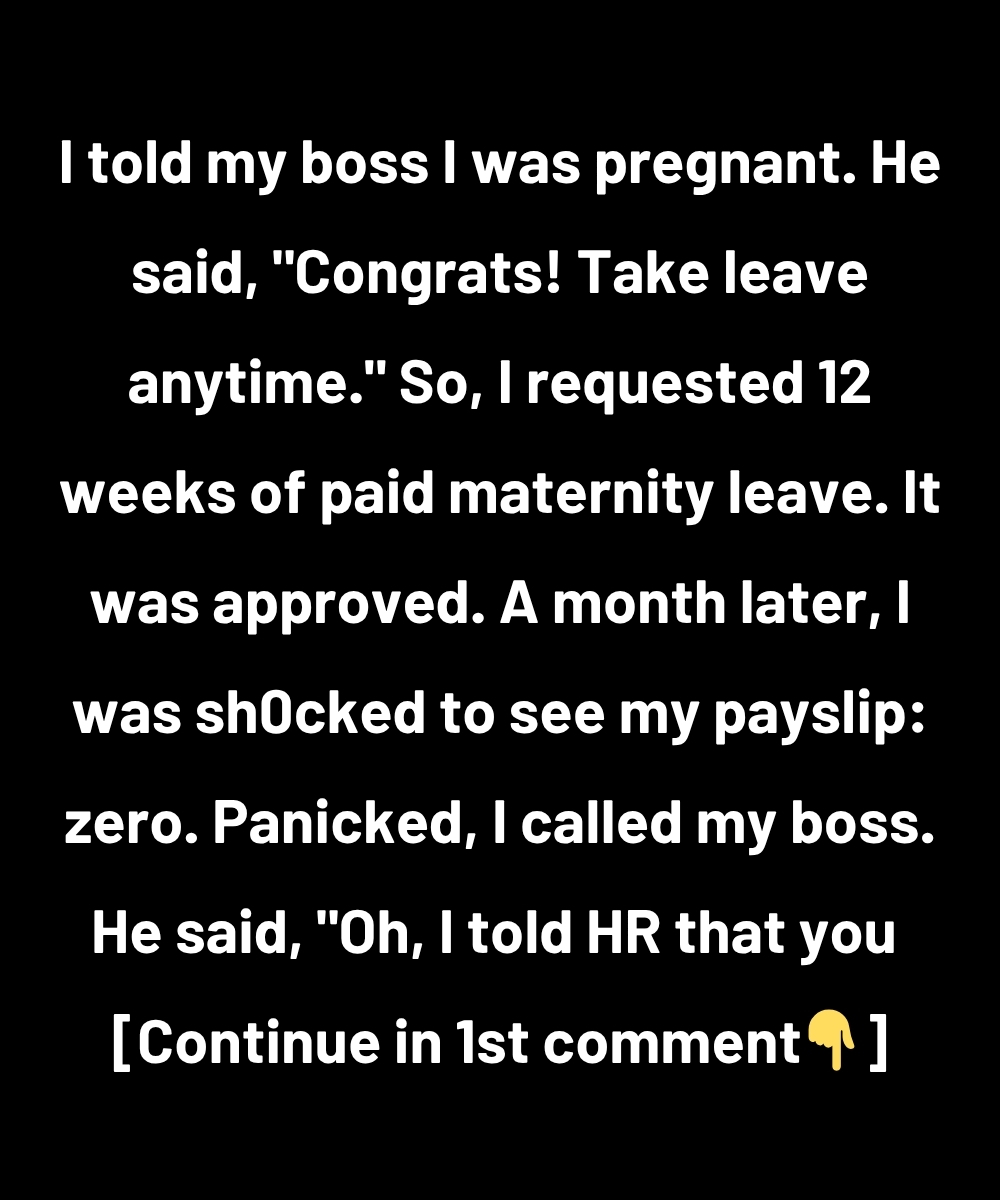I told my boss I was pregnant. He said, “Congrats! Take leave anytime.”
So, I requested 12 weeks of paid maternity leave. It was approved.
A month later, I was shocked to see my payslip: zero. Panicked, I called my boss.
He said, “Oh, I told HR that you resigned.”
I froze.
My mind blanked for a few seconds before I managed to stammer, “What? I never said I was resigning!”
He chuckled, like it was no big deal. “Well, you’re taking 12 weeks off. That’s almost three months. We assumed you weren’t coming back.”
That “we” hit harder than I expected. It wasn’t just him—it was the company I’d been loyal to for six years. I hung up in disbelief, my heart racing, holding my swollen belly with one hand while trying to hold it together with the other.
My name is Daria Moreno. I’m 31, and until a month ago, I thought I had a secure job at a mid-sized architecture firm in Phoenix. I wasn’t rich, but I was comfortable. I worked my way up from assistant drafter to senior project lead. I earned that maternity leave.
So yeah, being told I’d “resigned” when I was about to become a first-time mom? That crushed me.
I called HR immediately, demanding answers. The woman on the other end, Sylvia, paused when I said my name. I could almost hear her swallowing her nerves. She said they had an “email from management” that I chose to “step down during the leave” and they “processed the resignation accordingly.”
I never sent that email. I asked for a copy. She said she’d “see what she could do.”
Two days later, I got it.
The resignation letter.
Typed. Signed “Daria M.” Sent from an internal office email I hadn’t used in months.
I didn’t know whether to scream or cry. Someone had faked my resignation. And someone in management signed off on it.
That someone was probably my boss—Peyton Keel. Charming, slick, and always smiling just a little too much. Peyton had joined the firm two years ago. He always gave me weird vibes, but he knew how to make himself likable.
I showed my fiancé, Mikal, the letter.
He squinted at it and said, “This looks fake. The tone isn’t even how you write.”
Exactly.
But proving that wouldn’t be easy. HR already “closed the file.” I wasn’t on payroll anymore. I didn’t even get my benefits.
For the next week, I went from crying to planning, and back to crying. I wasn’t just losing money. I was losing healthcare. With a baby due in less than two months.
That’s when I remembered—my company used Slack.
It was a long shot, but I logged into my work Slack account, fully expecting it to be disabled.
It wasn’t.
They forgot to remove me from Slack.
And that’s how everything started to unravel.
Scrolling through my DMs, I found something Peyton must’ve forgotten: an old conversation from a few weeks ago where I’d clearly mentioned, “I’ll be back after 12 weeks. Already coordinated coverage for my projects!”
That was proof I never resigned.
I took screenshots. Dated messages. Slack timestamps. Everything.
Then I checked the company server logs.
(Okay, Mikal’s a tech nerd—he helped with that part.)
We found something strange: my internal office email—the one the fake resignation was sent from—had been accessed by someone else’s device. A laptop tagged as “PK-Admin.”
Peyton Keel.
The guy had literally logged into my account to send a fake resignation.
I felt sick. Betrayed. But also… kind of furious.
So I made a plan.
I sent one email. Just one.
To Sylvia in HR, with the subject line: “Resignation Fraud – Formal Complaint”
I attached the Slack screenshots, server access logs, and the email headers from the resignation.
And then… I waited.
For three days, nothing.
Then, I got a call from an outside number. It was Lara, the company’s legal counsel. She sounded calm, polite, almost too polite.
“We’re reviewing your case thoroughly, Daria,” she said. “This is very serious.”
You don’t say.
She asked me not to contact anyone else at the company “while they investigated.” I agreed.
A week passed.
Then two.
During that time, my baby—my daughter—arrived.
Her name is Leni. She came two weeks early, just after sunrise. Mikal held my hand the whole time. When they placed her on my chest, I sobbed. Not because I was scared or broken—but because for the first time in weeks, I felt peace.
But peace didn’t last long.
A week after Leni was born, I got a package from the company.
Inside: a check for two months of pay, a letter of apology from the CEO, and a message that “Mr. Peyton Keel is no longer employed with the firm.”
No fanfare. No press. Just… gone.
Apparently, it wasn’t just me.
Turns out, Peyton had done this to two other women who went on maternity leave in the past year. Faked “resignations,” reassigned their projects, and quietly cut them out. One of them had left without fighting it—thinking it was a “clerical error.”
The other had tried to sue, but lacked hard evidence.
My digital trail made the difference.
I was asked to sign a confidentiality agreement in exchange for a severance package and guaranteed healthcare for the next year.
But I didn’t sign.
I told them I wanted one thing: to speak directly with the CEO.
And to my surprise, they agreed.
Over Zoom, the CEO—a woman named Marla—sat stiffly in a gray office.
She looked tired. But she also looked embarrassed.
“I want to apologize directly,” she said. “We trusted Peyton. That was a mistake.”
I told her I accepted her apology—but I wasn’t keeping quiet.
“You lost three great employees because of one man’s ego,” I said. “If I hadn’t found those Slack messages, I’d still be unemployed. Pregnant. And terrified.”
She nodded. “I understand.”
What she did next genuinely surprised me.
She offered me my job back. Same title, same pay, full remote until I was ready to return.
And more importantly: she launched a full HR audit of the company’s parental leave practices. Including a new policy that required multiple written confirmations for any resignations made during leave.
That should’ve been the end of it.
But something about it still didn’t sit right with me.
So I found the other two women. The ones Peyton had screwed over.
One of them—Candace—was working at a café now. The other, Emina, had started her own consulting firm from home.
I told them what had happened. What I uncovered. How I fought back.
Candace cried. Emina was furious. But mostly, they were relieved someone had said something.
Together, the three of us went back to the firm—not to return, but to propose something bigger.
A parental support initiative. Paid mentorships. Guaranteed return roles. Maternity and paternity buddy systems. We pitched it all.
And the company? They agreed.
They even named it the “Leni Initiative.”
After my daughter.
Now, two years later, I work part-time as a consultant for other companies looking to reform their parental leave systems.
Leni’s learning how to say “architecture.”
And Mikal? He quit his IT job and started a daddy blog about navigating fatherhood and feminism. It’s weirdly popular.
So what’s the lesson?
Honestly, it’s this:
Sometimes, the people you trust the most will let you down in the worst way. But if you stand up, if you dig for the truth—even when you’re tired, scared, pregnant, and completely over it—you can win.
And when you win, you don’t just fix it for yourself.
You make sure the next person doesn’t have to fight the same battle.
If you’ve ever felt silenced, betrayed, or ignored at work—especially when you needed support the most—don’t stay quiet. Speak up. You might be the one voice that starts the change.
💬 Share this if you believe no one should be punished for becoming a parent.
❤️ Like if you’ve ever had to fight for what you were already promised.




